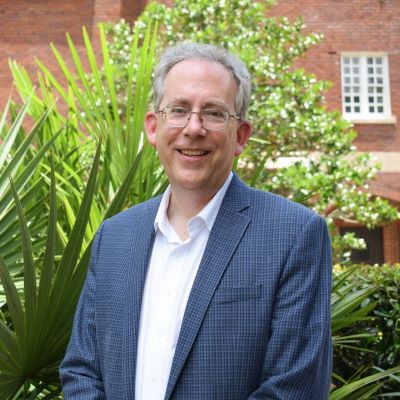
As I settle into my first weeks as department chair, fourteen years after the conclusion of my first term, senses of familiarity and difference are battling it out in my mind. Same office, same furniture, same view out the window. And, of course, some of the same faculty and staff who have long made this department such an outstanding place. On the other hand, I cannot help but recall that in the 2022 newsletter, Jon Sensbach described the department I served back then as “a world that no longer exists.” In many ways, he is right. One glance at this edition of our newsletter confirms how much is new and exciting. And yet, today’s UF History is built on, and deeply connected to, the foundational work of generations of students and faculty.
In my own historical work, I have occasionally deployed the concept of “social networks” as a way of understanding lived experience. When I think about UF History, I cannot help but recall two useful concepts from experts in social network analysis. First, social networks are continuously evolving and dynamic. The “past” of UF History is never really done, because today’s networks are built on and include so many former students, faculty, and staff. We wouldn’t be the same without those connections. Second, what really matters in a social network is not lines between points, but what is transmitted across those lines. What are we communicating across our lines of connection? The key to making networks work for people is building active and positive relationships.
Today’s Department of History is building networks as robust and interesting as ever before. Read this year’s newsletter, and you will see the undergraduate recipients of our Bridget Phillips Award pursuing historical research at archives around the world. Four outstanding new faculty hires have instantly expanded our capacity and reach. And, as our graduate students head out into the world with their degrees, we welcome a new cohort of students who bring with them a remarkable range of experience.
If one were to try and illustrate our social network, our many thousands of alumni, both undergraduate and graduate, would take by far the largest amount of space on that map. I have made it one of my highest priorities as department chair to improve our network connections with alumni. An important first step has been the creation of a History Advisory Board, launched with ten incredibly talented UF alumni. The advisory board will be meeting in person here on campus this November 1, and among the many agenda items, we will be discussing how to improve our connections with the rest of our alumni network. My goal is to better connect our current students to our many accomplished graduates. In a world that does not always value history education or the liberal arts generally, there can be no better encouragement and support for today’s students than the mentoring and support available from our alumni. If you are one of our alumni—keep an eye out for communications from me or the board!
In the meantime, there is a quick and easy well to strengthen our network. Please take a moment to complete our revised alumni survey. Your responses will be very helpful to us.
I look forward to what the new academic year has to bring. And let me invite you to reach out to me directly with any questions, ideas, or just to say hello, at spillane@ufl.edu.
Sincerely,

Joe Spillane
Professor and Chair